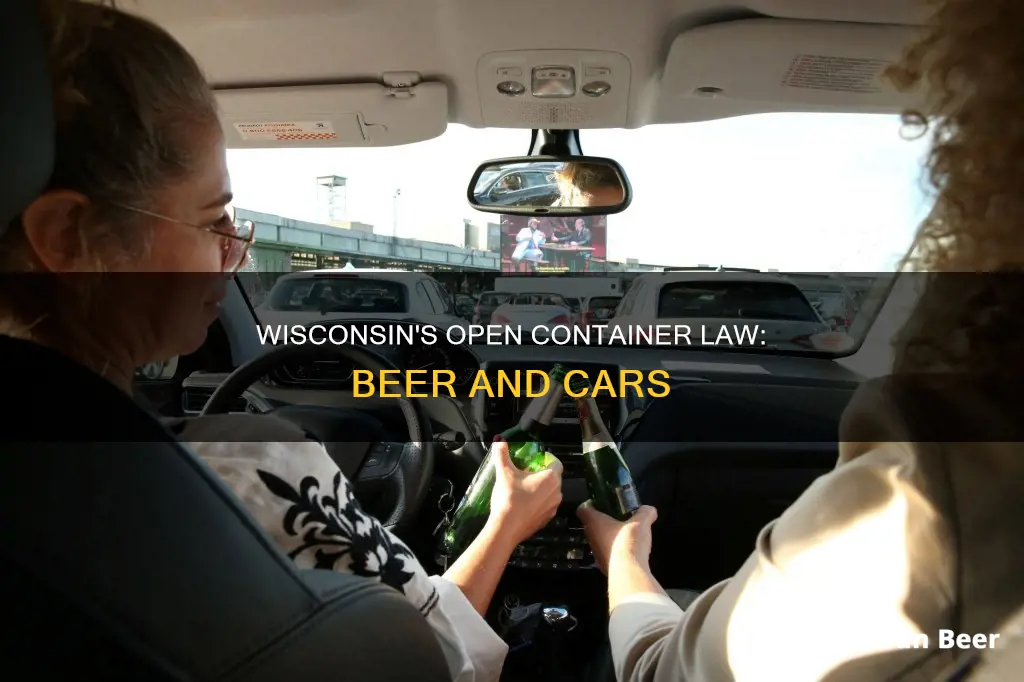
In the state of Wisconsin, it is illegal for passengers to drink beer in a moving vehicle. Wisconsin's open container law prohibits anyone from possessing or consuming an alcoholic beverage in a privately-owned vehicle if the beverage is open, has a broken seal, or if the contents have been partially removed. This law applies to both the driver and passengers of the vehicle and is in place to prevent drunk driving and the potential consequences that come with it.
| Characteristics | Values |
|---|---|
| Can passengers drink beer in a vehicle in Wisconsin? | No |
| Who does the law apply to? | Everyone inside the car (driver and passengers) |
| What type of vehicles does the law apply to? | Privately-owned vehicles on public highways |
| What is considered an "alcoholic beverage"? | Any fermented beverage, wine, or intoxicating liquor |
| What is considered an "open container"? | A container with a broken seal, no lid, or partial contents |
| Where can open containers be placed in a vehicle? | In the trunk, behind the backseat, or in an area not inhabited by passengers |
| Are there any exceptions to the law? | Yes, passengers in limousines or buses operated by a licensed chauffeur are permitted to possess and consume alcohol |
| What are the penalties for violating the law? | Fines of up to $100 for standard open container tickets; increased fines and license suspension for underage offenders |
What You'll Learn

What constitutes an open container?
In Wisconsin, an open container of alcohol is one that has a broken seal, no lid or other closure, or that has only part of its contents remaining. This means that if you open a beer bottle but do not drink from it, it is considered open. Similarly, if you drink from a bottle and then close it, it is still considered open because some of its contents have been removed. Alcohol in a flask is also considered an open container.
Wisconsin law prohibits any person from possessing or consuming an alcoholic beverage in a privately-owned vehicle if the beverage is open or has a broken seal, or if the contents have been partially removed. This applies to both the driver and passengers and includes all vehicles located on public highways. The law defines "alcoholic beverage" as any fermented beverage, wine, or intoxicating liquor. Unusually, Wisconsin's open container restriction also applies to containers of nitrous oxide.
The open container law does not apply to certain types of vehicles, such as statutorily authorised limousines and buses operated by a licensed chauffeur. Passengers inside these vehicles are permitted to possess and consume alcohol, as long as they are over the age of 21.
If you wish to transport an open container of alcohol in your vehicle, it must be placed in an area that is inaccessible to the driver and passengers. This typically means the trunk of the car. If your vehicle does not have a trunk, you must place the container somewhere that is out of reach for the driver and passengers, such as the bed of a pickup truck. It is important to note that areas like the glove box, under the seat, or the centre console are not considered acceptable locations for open containers.
Beer and Watermelon: A Safe, Sweet Combo?
You may want to see also

Where can you legally transport an open container?
In Wisconsin, it is illegal to have open containers of alcohol in a motor vehicle. This applies to both the driver and passengers, and to all vehicles located on public highways. The law prohibits possessing or consuming an alcoholic beverage in a privately-owned vehicle if the beverage is open or has a broken seal, or if the contents have been partially removed.
There are, however, some exceptions to the open container laws in Wisconsin. Passengers in certain types of vehicles, such as statutorily authorized limousines and buses operated by a licensed chauffeur, are permitted to possess and consume alcohol. Additionally, Wisconsin's open container laws do not apply to areas of the vehicle that are inaccessible to the driver or passengers, such as the trunk or areas without a trunk, like the bed of a pickup truck.
While the laws vary from state to state, there are some general guidelines for where you can legally transport an open container in the United States. In most states, open containers are prohibited in the passenger compartments of non-commercial motor vehicles located on public highways or rights-of-way. This includes areas such as the glove compartment or any other areas readily accessible to the driver or passengers. However, open containers are generally allowed in the trunk or other areas that are not easily accessible from the passenger area.
In certain types of vehicles, such as taxis, limousines, and other "for-hire" vehicles, as well as the living quarters of motor homes, campers, or recreational vehicles, passengers may possess or consume open containers. Additionally, in some states, open containers may be permitted in specific public places, such as downtown districts or during holidays and sporting events. For example, in Gainesville, Florida, and Hood River, Oregon, the consumption of alcoholic beverages in public is allowed.
Beer and Acetaminophen: A Safe Mix?
You may want to see also

What are the penalties for violating Wisconsin's open container law?
In Wisconsin, it is generally illegal to have open containers of alcohol in a motor vehicle. This applies to both the driver and the passengers. An open container is defined as a container with a broken seal, no lid or other closure, or one that has only part of its contents remaining. A beer bottle that has been opened but not consumed from is considered an open container.
The penalties for violating Wisconsin's open container law depend on the violator's age and type of driver's license. For a standard open container violation, the penalty is a fine of up to $100, with no jail time. However, a person may still be arrested and detained if other circumstances exist that justify further detention.
For those operating commercial vehicles, a violation will result in an out-of-service order, prohibiting the operation of a commercial vehicle for 24 hours. This is in addition to the standard fine.
Underage offenders (under 21 years old) face a fine of $20 to $400 for a first violation and up to $1,000 for a second violation within 12 months. Additionally, they may have their license suspended for up to one year for the first violation and up to two years for a second violation.
While Wisconsin's open container law primarily targets alcoholic beverages, it is important to note that the state uniquely includes containers of nitrous oxide under this restriction as well.
Beer and Type 2 Diabetes: What's Safe?
You may want to see also

Are there any exceptions to the open container law?
In Wisconsin, open containers of alcohol inside a vehicle on a public roadway are illegal. However, there are some exceptions to the state's open container law.
Firstly, the open container law does not apply to all vehicles. Passengers in limousines and party buses, or buses and similar vehicles operated by a licensed chauffeur, are allowed to possess and consume alcohol. However, this exception does not apply to persons under the age of 21.
Secondly, the open container law only applies to the passenger areas of the vehicle, including the glove and utility compartments. It does not apply to items in the trunk of the car or to areas that are inaccessible to the driver or passengers if the car does not have a trunk. So, if you have an open container of alcohol, you can place it in the trunk or another area of the vehicle that is out of reach, and it will not be considered a violation.
Additionally, the open container law does not apply to vehicles used for transportation for pay, such as taxis, or the living quarters of motor homes, campers, or recreational vehicles.
It is important to note that the open container law in Wisconsin also applies to containers of nitrous oxide.
While there are some exceptions to the open container law in Wisconsin, it is still illegal for anyone underage to possess or consume alcohol, and penalties may be more severe if the offender is under 21.
Beer Drinking in Universal Studios: What's Allowed?
You may want to see also

What are the penalties for underage offenders?
In Wisconsin, underage drinking is a serious offence that can result in various penalties for those found violating the law. As of March 27, 2024, the possession or consumption of alcohol by a minor will result in a fine of $100 to $200. The state of Wisconsin has a zero-tolerance policy for underage drinking and driving, and any underage individuals found to be operating a vehicle under the influence will be arrested.
The penalties for underage drinking in Wisconsin increase with the number of offences within a year. A second offence will result in a fine of $200 to $300, while a third offence will incur a fine of $300 to $500. For a fourth and subsequent offence, the fine increases to $500 to $1000. These penalties can be further exacerbated by aggravating factors, such as causing injury or property damage, or if the offender has prior convictions for alcohol-related offences.
In addition to fines, underage offenders in Wisconsin may also face license suspension. A first violation will result in a suspension of up to one year, while a second violation within 12 months will lead to a suspension of up to two years. These penalties are designed to deter underage individuals from consuming alcohol and to reduce the negative impact of underage drinking on society.
Underage drinking is not only costly for the individual but also for the state of Wisconsin, with an annual cost of $1 billion in pain and suffering, work loss, and medical costs associated with the mistakes of underage drinkers. It is important to note that the legal drinking age in Wisconsin is 21, and any person under this age is considered a minor. The state also has a Social Host Law, which holds adults responsible for allowing underage drinking on their property, with fines of $500 for a first offence.
Beer and Glutathione: A Healthy Mix?
You may want to see also
Frequently asked questions
No. In Wisconsin, it is illegal to have open containers of alcohol in a motor vehicle. This applies to both the driver and passengers.
A container with a broken seal, no lid, or only part of its original contents.
Yes, passengers in limousines or motorbuses driven by a chauffeur are allowed to consume alcoholic beverages.
Violation of the open container law is considered a traffic violation and can result in a fine of up to $100 for the driver or passenger. Penalties are more severe if the offenders are under the age of 21.







